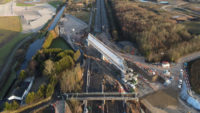
Builders of both bridge and rail infrastructure are eyeing the next several weeks with a heightened sense of urgency—hoping against hope that Congress will manage to pass some version of President Obama's proposed $302-billion, four-year transportation reauthorization bill. At the same time, alternative delivery methods such as public-private partnerships are higher than ever on the collective transportation agenda.
Transit and rail would be big winners in the bill, called the Grow America Act. It would move a highway-centric program into a more mode-neutral policy and provide $72 billion to transit—a 70% increase, noted Therese McMillan, deputy administrator of the Federal Transit Administration. The FTA's top priority is to address the infrastructure-needs backlog, she told attendees of the American Public Transportation Association's rail conference, held earlier this month in Montreal.
Citing the conference site's proximity to a deadly freight-rail crash last year, Federal Railroad Administrator Joe Szabo emphasized safety investments. The bill would provide $2.3 billion for positive train controls and a new "confidential close calls" system to identify causes of high-risk rail situations, he said.
The agenda included numerous sessions on alternative project delivery and non-traditional means of revenue. "There is a wide range of alternatives for delivering projects, and the right way to go will vary based on a number of conditions, such as size, level of unknowns and associated risk, impacts to other projects or systems, and readiness of the owner to implement change," says Cosema Crawford, senior vice president with Louis Berger Group and a panel moderator.
Joe Marie, a panelist and Parsons Brinckerhoff vice president, cited examples of successful projects ranging from traditional design-bid-build to P3s. Particularly for P3s, the owner "must understand when to be prescriptive" and when not to be, he noted. "Don't get into [the builders'] means and methods" when the goals are, for example, on-time performance and reliability, Marie said. But in one case, station design warranted more prescriptiveness because the owner specifically wanted the stations to blend into the community, he added.
Bridging the Future
Pennsylvania's planned P3 for rapid replacement or rehabilitation of 560 bridges under a 25-year concession will have prescriptions, cautioned Tom Macioce, chief bridge engineer with the Pennsylvania Dept. of Transportation's bureau of project delivery, speaking to attendees of the International Bridge Conference in Pittsburgh this month. For example, the mostly single-span bridges will have certain requirements, such as precast decks and ultimate-high-performance concrete.
However, there will be performance-based management, maintenance and turnback requirements as well as opportunities for Alternative Technical Proposals, he added.
Macioce was preceded by Herbert Morgan, senior vice president with Fluor Enterprises Inc., who noted that Fluor's team won the Tappan Zee Bridge replacement project at "$3.5 billion out of $5 billion—that happens when you are allowed to be creative, not prescriptive."
The Federal Highway Administration plans to establish standards for bridge and tunnel inspections, with a rule-making notice to come later this year, said Walter Waidelich Jr., FHWA associate administrator for infrastructure. Bridges will be rated "good," "fair" or "poor," added Bruce Johnson, Oregon Dept. of Transportation state bridge engineer.
But if Congress does not act, meeting future standards will be less a concern than how to make ends meet. The existing transportation trust fund will run dry, possibly within weeks. In Montreal, Phil Washington, general manager of Denver's Regional Transportation District, asked McMillan and Szabo, "We tried the message that our bridges are failing, and that didn't work. Are we going to get a bill?"
Szabo remains optimistic but added, "I'm not sure that there is a realization in Congress of how dire the crisis is."


Post a comment to this article
Report Abusive Comment